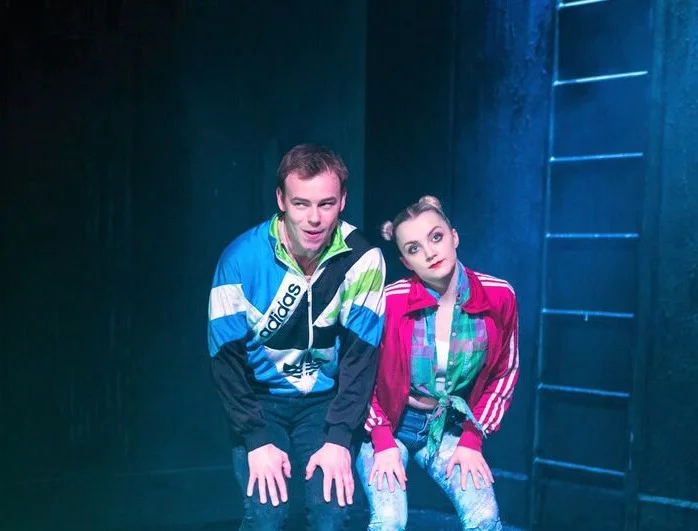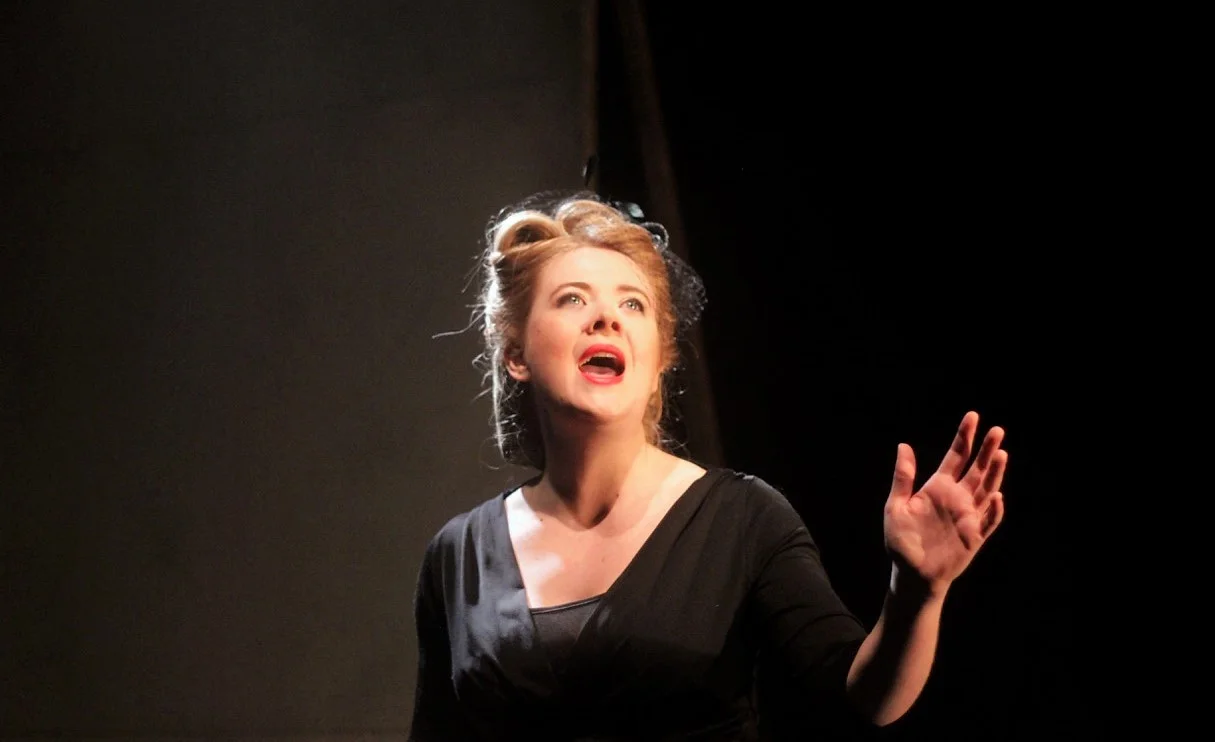Scott Organ’s opening scene for The Thing With Feathers is deceptively creepy for anyone attuned to the dangers of the Internet. A young girl, Anna (Alexa Shae Niziak), is sitting on her bed, with paperwork around her, and she’s talking to a man named Eric—someone she has never met. They have clearly bonded online over poetry, particularly Emily Dickinson. They recite stanzas of Dickinson’s “Life” to each other: “For each ecstatic instant/We must an anguish pay/In keen and quivering ratio/To the ecstasy.” The voice gently probes elements of her home life and her relationship with her mother. The scene promises a literate, solidly structured drama, and it delivers.
A Kind Shot
In basketball, as Terri Mateer instructs in her solo show, a kind shot is one that touches nothing but net. No bouncing off the backboard, no clanging around the rim, just a sphere on a pristine trajectory that ends with a satisfying swish. Basketball was an integral part of Mateer’s high school, college, and young adult years, but the arc of her life was anything but clean. In an extended monologue that at times devolves into a bull session with the audience, then pivots into entertaining b-ball play-by-play, she recounts how the loss of her father gave way to a series of mentors, some wanting to help her, others wanting to help themselves to her. Though the dialogue could stand some tightening, and a director could help Mateer better realize the moments that call out for a pause, her saga, her stage presence and her intimate style of delivery bring home a win. The fact that her story is also one of outracing relentless sexual harassment, shows that her cultural timing is as strong as the pass timing of her youth.
X: Or, Betty Shabazz v. The Nation
X: Or, Betty Shabazz v. The Nation by Marcus Gardley is not only a portrait of Malcolm X, the optimistic and eloquent civil rights leader who was assassinated in 1965, but also of a dangerous and tumultuous time. In Gardley's play, time and place dissolve from one scene into another—a courtroom, the home of Malcolm (poignantly played by Jimmon Cole) and his wife, Betty Shabazz (Obie winner Roslyn Ruff), as well as the street; an office; and the home of Elijah Muhammad, leader of the Nation of Islam. In all the scenes Gardley focuses on a question that dominates the court: who killed Malcolm X?
The Undertaking
Now in their 17th year, The Civilians have etched out a unique place for themselves in the New York theater scene. Employing what they refer to as “investigative theater,” company members gather source material as journalists, then transform their research into art. In The Undertaking, two performers, portraying multiple characters, enact real-life interviews centered on the act of dying. Lip-syncing, film appreciation, a small warehouse of electronic devices and a pillow fort are all utilized as the characters take an inward trip to the hereafter and expound on shuffling off this mortal coil. All the while, the production comments upon itself and divulges its own techniques. Death may be the subject of this play, but its theme is creation.
Hindle Wakes
Stanley Houghton’s bracingly unsentimental Hindle Wakes failed twice on Broadway, expiring after 30-odd performances in both 1912 and 1922. In a new century, the Mint Theater Company is demonstrating that this little-known play with its perplexing title is a compelling period piece. Directed by Gus Kaikkonen and performed with unrelenting gusto, Hindle Wakes is likely to prove more enduring this time around.
Disco Pigs
Disco is one of those words that the senses respond to instantly with several very particular references: late 1960s or early ’70s New York City spring to mind. However, the world of Disco Pigs is a far cry from that, and disco assumptions are turned on their head. Enda Walsh’s play strips the term bare of its bright-lights, big-city ballroom connotations, throws a hefty dose of punk into the trunk, then turns off-road onto the aimless side of life. But it does so with deep, dark humor, wide-eyed invention and heaps of passion.
The LaBute New Theater Festival
The LaBute New Theater Festival is one of the rare times that one-acts get center stage (along with Author Directing Author, playwright Neil LaBute’s annual presentation of one-acts by him and Italian playwright Marco Calvani). The current trio of offerings provide two very strong entries and one, unfortunately, that isn’t. It’s the short-form champion’s own curtain-raiser that is the disappointment.
The Girl Who Jumped Off the Hollywood Sign
The Golden Age of Hollywood conjures ideas of glamour, romance and Technicolor hues—but behind the scenes, the reality of the industry wasn’t always the rosy picture portrayed on screen. These two sides of Hollywood’s past are now being explored in The Girl Who Jumped Off the Hollywood Sign, a one-woman show that transports the audience back to the Hollywood of yore.
Mankind
Robert O’Hara’s new play, Mankind, opens with a gay couple’s strained pillow talk, as one man, Jason (Bobby Moreno), advises his partner, Mark (Anson Mount), that he is pregnant—by Mark. From that simple start O’Hara spins a broad, futuristic satire of sexuality, feminism, religion, commerce and talk shows. It’s more than the playwright is able to manage smoothly, and much of it feels familiar, but it has its moments before it arrives at its circular ending, one reminiscent of Ben Hecht and Charles MacArthur’s Twentieth Century.
Twelfth Night
The Fiasco Theater production of Twelfth Night is energetic, clearly spoken and firmly middle-of-the-road. The company, with standard members, must try to cast every actor in a part, even if the requirements are slightly off. In Shakespeare’s story of twins, a brother and sister, who are shipwrecked in a foreign country, Illyria, where they have amorous mix-ups before they are reunited, an audience may notice that Emily Young’s slender Viola bears little resemblance to Javier Ignacio’s chunkier Sebastian, apart from wearing glasses and a ribbed, russet sweater, though it’s unlikely that will spoil one’s enjoyment.
Bulldozer: The Ballad of Robert Moses
Decades after his death, Robert Moses’s legacy is still felt throughout New York City, from the Triborough Bridge to Lincoln Center. As the urban planner responsible for much of the city’s 20th-century roadways and infrastructure projects, Moses had a polarizing career, making lasting improvements to the city and the surrounding area even as he was criticized for imposing his plans, no matter the consequences. New Yorkers traveling through Moses’s former domain to the Theatre at St. Clements, however, will find little unique insight into the man behind the infrastructure at Bulldozer: The Ballad of Robert Moses, a bio-musical of the master builder who outlasted mayors and governors to impose his will on New York City and the surrounding area from the 1920s through the 1960s.
Counting Sheep
Counting Sheep is immersive theater at its very best. Billed as a “guerrilla folk-punk opera,” the work is about the 2013–14 Ukrainian Revolution in Maidan Square, in the Ukrainian capital of Kiev. And it is into the arms of this revolution (also known as the Revolution of Dignity), as it spreads from the youth to Ukrainian people of all ages, that the members of the audience are thrust.
De Novo
Imagine the life of a young lad who was never told that he was a good kid. “From the time [Edgar Chocoy] was born,” says immigration defense lawyer Kimberly Salinas (Emily Joy Weiner) in the documentary-theater piece De Novo, “he was seen as this poor kid from the slums of Guatemala City, then a gang kid from East L.A., then a criminal alien teenager in Immigration Court. I don’t think anyone ever got to see who he really was.” Salinas’s reflection makes clear that a seemingly trivial detail such as this can impose serious implications on a person’s self-esteem and that a life can sustain enormous consequences from it.
Downtown Race Riot
Only moments into Downtown Race Riot, playwright Seth Zvi Rosenfeld skillfully plunges the audience into a milieu that Republicans in the current political landscape fulminate over. An indigent mother (Chloë Sevigny), advises her son Pnut (pronounced peanut) that she has a foolproof plan to earn money, but she will need his help when her lawyer comes by shortly. “Listen to me,” she says, “I’m gonna bring up your asthma so have your inhaler ready and if you have to fake a cough, be prepared…. And you may have to act mildly retarded.” With a sluggish indifference, unless she’s animated by a new scam, Sevigny expertly inhabits her character, Mary, with her semi-glassy eyes (she’s a recovering addict, and not too far on the road to recovery to turn back decisively) and a confidence in her own craftiness.
20th Century Blues
Aging is the lens through which Susan Miller’s 20th Century Blues explores the relationships of four women who have known one another for 40 years. The play focuses on the baby-boomer generation and zooms in on how they deal with themselves, their friendships and their social status.
Harry Clarke
Billy Crudup has built a career playing charming rogues in films like Almost Famous, Eat Pray Love, and last year’s 20th Century Women. It makes perfect sense when his character is revealed as (11-year-old spoiler alert!) the real villain of Mission: Impossible III because Crudup is credible as both hero and villain; there’s always a hint of psychosis underpinning his boy-next-door looks. He’s indulged this duality in his stage roles as well (The Elephant Man, The Pillowman, The Coast of Utopia), but none has exploited the dark under his light as successfully as Harry Clarke, David Cale’s new one-man show at Vineyard Theatre.
Hot Mess
A retitled version of Regretrosexual—The Love Story, a play written roughly 10 years ago by Dan Rothenberg and Colleen Crabtree, the “new play” Hot Mess is about the authors’ unusual courtship and marriage. Both were comedians working in Los Angeles, and the work focuses on a particular hurdle Rothenberg had to overcome: he had lived as a gay man for two years in San Francisco before meeting and marrying Crabtree. Scrubbing out the “regret” part of the former title and using the catchier Hot Mess eliminates the implication of previous disappointment in the age of political correctness.
Pride and Prejudice
Don’t underestimate Jane Austen. Her authorial voice, distinctively witty and humane, rings out above the Gothic din of early 19th-century fiction. Two centuries after her death, this middle-class provincial’s novels still enchant readers with their verisimilitude and authenticity, despite how radically manners and morals have changed.
The Mad Ones
Kait Kerrigan and Brian Lowdermilk are the Rihanna of musical theater. Just as the Barbadian pop goddess releases hit song after hit song while selling relatively few albums, Kerrigan and Lowdermilk are less known for their plays than for their individual tunes, which have gained them a rabid online following. Their contemporaries Benj Pasek and Justin Paul (Dear Evan Hansen, La La Land) have conquered Broadway and Hollywood, but Kerrigan and Lowdermilk have connected with the millennial fan base like no other musical theater writers; they’re the official composers of the Internet. Now, several of their conversationally catchy pop songs have found their way into the long-gestating original musical The Mad Ones, playing at 59E59 Theaters.
Peter Pan
The boy who wouldn’t grow up has become the character who won’t die. J.M. Barrie’s Peter Pan has been endlessly staged, filmed, remixed, twisted, and contorted since its 1904 premiere at the Duke of York’s Theatre, London, and the insatiable Pan pangs show no sign of ceasing. Bedlam’s current adaptation at another Duke, on 42nd Street, is the second Peter Pan–inspired show to run on the Deuce this season.
























